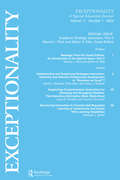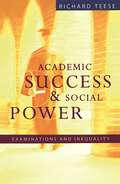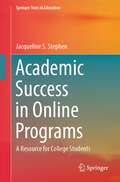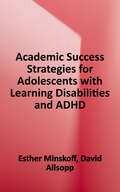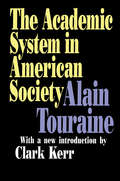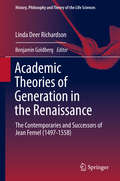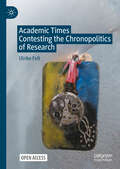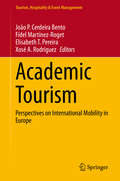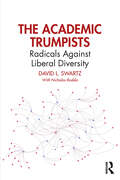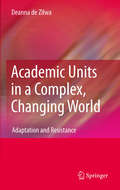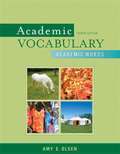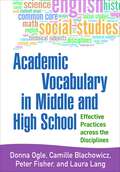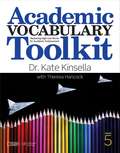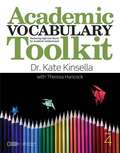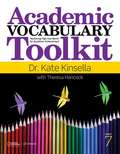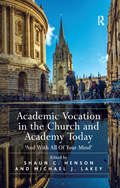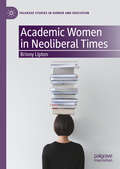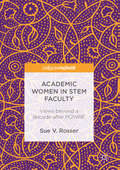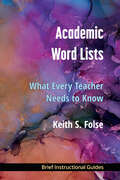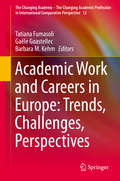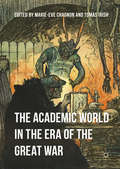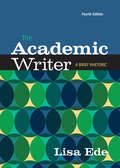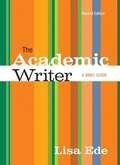- Table View
- List View
Academic Strategy Instruction: A Special Issue of Exceptionality
by Marcia L. Rock Edwin S. EllisThis special issue, Part II in a series devoted to the topic of strategic instruction, explores the issue of traversing the research to practice abyss through the implementation of authentic and effective business development. It reminds us that "business as usual" approaches to teacher in-service programs are unlikely to produce meaningful changes in teachers' classroom practices. In addition, this issue offers strategic instructional approaches to facilitate students' learning and focuses on structuring instruction to promote self-regulated learning. Each article raises important questions about existing practices and offers innovative alternatives to improve outcomes for students and teachers.
Academic Success And Social Power: Examinations and Inequality
by Richard TeeseA most significant text that says something new about how student achievement is shaped. Richard Teese cuts across much of the recent talk about reform and allows us to think about the issues afresh. His findings will fascinate all. Professor Simon Marginson, Monash University This eye-opening study of Australian secondary education looks beyond clich�s about 'excellence' to analyse the historically specific nature of the scholarly ideal against which successive generations of Australian students have been judged. Drawing on a wealth of strikingly original research, Richard Teese offers a penetrating analysis of Victorian secondary schooling in the half-century after World War Two. This was a era in which higher secondary schooling ceased to be the preserve of an elite and emerged as a system of mass education. It was also a period marked by successive waves of reform in curriculum and assessment. Yet, at the end of it all, Australians have been left with a sharply polarised system of schooling in which the most economically vulnerable populations of young people are also those most at risk of educational failure. This book asks the hard questions. Are our systems of secondary teaching -- and the expectations they place on students -- anachronistic in an age of mass education? How far is the curriculum itself responsible for the manifest disparities in achievement between sectors and regions, and between boys and girls? What has been the universities' role in the process of reform and counter-reform? And what have all these upheavals implied for the practice of teaching?
Academic Success in Online Programs: A Resource for College Students (Springer Texts in Education)
by Jacqueline S. StephenThis book provides higher education students with a comprehensive resource to assist them in their academic persistence in an online course or program. It addresses a wide selection of topics emphasizing a myriad of factors that impact a student’s persistence, and ultimate success, in an online program or course. The book helps students to gain insight into the skills, knowledge, and attributes needed to succeed in the autonomous nature of an online learning environment. Thus, this book helps students to proactively engage in activities to prepare for online learning. Information presented in each chapter is drawn from theory and recent research centered on persistence of online students in higher education. It incorporates hands-on practical activities to promote application of theory and research, and encourages students to demonstrate their knowledge, skills, and abilities through the use of reflective and thought-provoking activities. Hence, this book provides online students with an up-to-date resource they can use to develop an awareness of their readiness and preparedness for online learning. Additionally, this book equips students with information and strategies aimed at helping them to address gaps in their skills and knowledge that may present them with barriers to academic success. The content of this book is aligned with widely used student learning outcomes and objectives of first-year student seminar courses and orientation programs for graduate and undergraduate students enrolled in online programs. Furthermore, it is deliberately organized and structured to support an online student’s academic journey as they navigate the online learning environment. As such, these features make it an ideal book for use by students, instructors, and academic advisors or college and university academic support staff.
Academic Success Strategies for Adolescents with Learning Disabilities and ADHD
by Esther Minskoff David AllsoppWith this strategy-filled handbook, education professionals will learn what they can do to help students with mild disabilities—from high school to post-high school—develop academic skills in: organization, test-taking, study skills, note taking, reading, writing, and math. <p><p> First, educators will work one-on-one with students to evaluate each student's learning style and individual needs. Then, for each of the areas listed above, educators will get a chapter with step-by-step cognitive learning strategies, case studies, and charts that summarize the steps as mnemonic devices. An overarching five-step model (the Active Learner Approach) for effective instruction helps teachers introduce these strategies to students, model the steps of the strategies for them, give students guided and independent practice applying the strategies to assignments, and assist students in generalizing the strategies to other subjects and settings. <p><p>With this easy-to-use guide, educators will be able to help students recognize their learning characteristics, apply strategies to meet the specific demands of their coursework independently, and reach their educational goals.
The Academic System in American Society (Foundations Of Higher Education Ser.)
by Alain TouraineAlthough the period of student protests of the 1960s and 1970s has long passed, Alain Touraine argues, in this wide-ranging and vigorous essay, that the period's problems remain with us. Higher degrees have become less and less valuable on the labor market and the demand for academic reform has become more intense. Community colleges still try to provide equal educational opportunities for the poor and the minorities, without much success. And the university has not yet resolved the conflict between being the home of impartial inquiry and research and serving constituent interests.Touraine views American higher education as a system within a definite, though changing, social context. He compares U.S. student movements with those of other countries. He is skeptical about the way Americans view the relationships between the university and what he regards as the ruling forces of the society, between knowledge and power, between production and education. He offers no facile solutions, but he presents an exciting, nontraditional analysis of the social and political forces that have shaped the modern history of higher education.In the new introduction, Clark Kerr contrasts his own views as an American observer to those of Touraine as a French intellectual. He asserts that the family, not higher education, is the most important "school" in the process of reproducing society. Kerr places more emphasis than does Touraine on the labor market, on the production functions (training of skills and advancing technology) of the vast nonelite segments of American higher education, on the long-term impacts of science in changing society, and on scholarly criticism in affecting transformations, and places less emphasis on sporadic political protests by faculty and students.He agrees with Touraine however, in his two great themes: (1) that you cannot understand the academic system unless you first understand society; and (2) that the rise of the university must be understood to understand modern society, where "knowledge is power." This volume will be important to all those interested in higher education, whether as participants or observers.
Academic Theories of Generation in the Renaissance: The Contemporaries and Successors of Jean Fernel (1497-1558) (History, Philosophy and Theory of the Life Sciences #22)
by Benjamin Goldberg Linda Deer RichardsonThis volume deals with philosophically grounded theories of animal generation as found in two different traditions: one, deriving primarily from Aristotelian natural philosophy and specifically from his Generation of Animals; and another, deriving from two related medical traditions, the Hippocratic and the Galenic. The book contains a classification and critique of works that touch on the history of embryology and animal generation written before 1980. It also contains translations of key sections of the works on which it is focused. It looks at two different scholarly communities: the physicians (medici) and philosophers (philosophi), that share a set of textual resources and philosophical lineages, as well as a shared problem (explaining animal generation), but that nevertheless have different concerns and commitments. The book demonstrates how those working in these two traditions not only shared a common philosophical background in the arts curricula of the universities, but were in constant intercourse with each other. This book presents a test case of how scholarly communities differentiate themselves from each other through methods of argument, empirical investigation, and textual interpretations. It is all the more interesting because the two communities under investigation have so much in common and yet, in the end, are distinct in a number of important ways.
Academic Times: Contesting the Chronopolitics of Research
by Ulrike FeltThis open access book explores the hidden politics of time—the chronopolitics—that profoundly shapes the contours of academic life and knowledge production in contemporary universities. Moving beyond familiar critiques of academic acceleration, Ulrike Felt explores the diversity of time generators and the resultant complex, multilayered timescapes that govern scholarly work and life. The book examines the tensions inherent in models of linear careers and in simultaneous experiences of speed and waiting, and asks questions about the ownership of time. In doing so, it scrutinizes relations between time and quality, and points to the impact of time on how and what we can know, revealing how these temporal regimes create deep asynchronicities and fragmentations and perpetuate injustices and exclusions. Arguing for a more mindful approach to research, Felt advocates for rethinking academia through the lens of time, emphasizing the need for temporal care work in order to achieve sustainable and responsible change. Aimed at researchers, academic leaders, and policymakers, the book offers a compelling vision for a more responsive, long-term, and equitable academic future—one that challenges neoliberal models that prioritise speed, competitiveness, and efficiency.
Academic Tourism: Perspectives on International Mobility in Europe (Tourism, Hospitality & Event Management)
by João P. Cerdeira Bento Fídel Martínez-Roget Elisabeth T. Pereira Xosé A. RodríguezThis book presents the latest knowledge on the still under-researched field of academic tourism, which over the past decade has gained in importance at local and national economic levels as a result of increasing international mobility of students and academic staff in higher education. A wide range of themes are explored from various perspectives, with the focus on Europe. Particular attention is paid to academic tourism demand, expenditure, and economic impact; the relationships between academic tourism and local and regional development, sustainable development, and environmental sustainability; and the importance of academic tourism for the internationalization of higher education and international cooperation and development. Further topics to be considered include the significance of academic tourism for the dynamics of tourism destinations and insights from experimental tourism research. In addition to theoretical chapters and state of the art reviews, readers will find insightful empirical and case studies. The book will be of interest to academics, researchers, students, and practitioners, including policy makers.
The Academic Trumpists: Radicals Against Liberal Diversity
by David L. SwartzThere has been an outpouring of research on populist conservatism since the advent of the Trump presidency and extreme right movements in Europe. Much less studied, however, is the growing political conservatism in the American academy and how it relates to populist sentiment. The Academic Trumpists addresses a gap in the research literature by looking at the impact of Trumpism on conservative faculty. It compares 109 professors who publicly support Trump to 89 conservative professors who oppose Trump. All 198 function as public intellectuals who advocated publicly their views.Drawing on recent research in the sociology of intellectuals and Pierre Bourdieu’s analytical field perspective, this book offers a fielding political identities and practices framework to show how these two groups of professors (Trumpists and anti-Trumpists) differ in where they teach, their intellectual orientations, their scholarly productivity, their political rationales, where they network with think tanks, scholarly professional associations, and government agencies, and their stances on key controversies surrounding the Trump presidency (Covid-19, the two impeachments, the November 2020 election lost, and the January 6 mob assault on the United States Capitol). The academic Trumpists embrace the right-wing populist wave mobilized by Trump and the conservative critics resist this move. This polarization of views between these two groups of conservative professors is enduring and rooted in two distinct social networks that connect their positions in the academic field to affiliations with conservative think tanks that reinforce their respective political identities and radical right-wing anti-establishment thinking in America more generally.This book will appeal to readers interested in the politics of higher education, the sociology of intellectuals, political sociology, and research on conservative and right-wing populism politics in America today.
Academic Units in a Complex, Changing World: Adaptation and Resistance
by Deanna De ZilwaThis book uses case studies of academic units from Australian public universities to explore the reasons why those units respond in different ways to similar contemporary challenges. The 'academic units'--departments, schools and faculties--in the world's public universities may be their own administrative fiefdoms, but the wider environment within which they operate is both complex and dynamic. In fact, today's academic landscape is barely recognizable from what it was like two decades ago. The globalization of higher education markets for students, faculty and research funding has expanded the challenges and opportunities for academic units beyond the boundaries of nation states. However, academic units must also deal with the diverse needs and expectations of national and local stakeholders, as well as operate within government regulatory and policy frameworks. In addition, they are required to adhere to policy and operational directives from institutional executives and consider the often-competing needs and expectations of other stakeholders such as faculty, students, employers, funding bodies and professional associations. As public funding slowly evaporates some university faculties have embraced the imperative to be more business-oriented. Others have shrunk from congress with Mammon. The milieu of tertiary education is having to adapt to fresh trends in this domain, such as the advocacy of marketization, entrepreneurialism and corporatization, the three pillars of so-called 'new public management'. With its case studies from different academic disciplines and types of university, this book asks some key questions: Why do some units adapt to environmental challenges and others resist change? How and why do academic units adopt different modes and processes of adaptation or resistance? Along with its new conceptual framework for the wider context, the text makes an important contribution to scholarship on leading and managing change in universities, while at the same time offering those in academic leadership positions relevant advice and practical suggestions to guide their units through these complex challenges. Where other academic studies have examined the university as an institution in its entirety, this focused study compares the decision-making on a lower rung of the administrative ladder.
Academic Universe: Research and Writing at Oklahoma State University (Second Edition)
by Hayden McneilAcademic Universe: Research and Writing at Oklahoma State University (2nd Ed.) is designed specifically for use in Composition II at Oklahoma State University by the instructors who teach the course. It has five chapters each detailing academic topics and problems under research by the Oklahoma State University faculty; Apparel Merchandising and Social Responsibility"; "Literacy and Multiculturalism"; "Television and Cultural Studies"; "Food Economics and Subcultures"; and "Conservation and Consciousness."
Academic Vocabulary, Academic Words (4th edition)
by Amy E. OlsenAcademic Vocabulary presents vocabulary building with a visually stimulating, full-color design to pique students' interest and make the process fun. This attractive, highly-interactive workbook improves academic word knowledge through academic readings and interactive exercises. Repetition of the words and getting the students to see the words used in multiple contexts improves memorization.
Academic Vocabulary in Middle and High School: Effective Practices across the Disciplines
by Donna Ogle Camille Blachowicz Peter Fisher Laura LangIn order to succeed in school and beyond, students in grades 6-12 need to understand and use both academic language and discipline-specific vocabulary. This book describes effective practices for integrating vocabulary study with instruction in English language arts, history/social studies, and math and science, and for helping students become independent, motivated word learners. The expert authors present a wealth of specific teaching strategies, illustrated with classroom vignettes and student work samples. Connections to the Common Core State Standards (CCSS) are highlighted throughout; an extensive annotated list of print and electronic resources enhances the book's utility.
Academic Vocabulary Toolkit: Mastering High-Use Words for Academic Achievement (Grade 5)
by Kate Kinsella Theresa HancockDr. Kate Kinsella's NEW Academic Vocabulary Toolkit for Elementary grades is designed to prepare students in grades 3, 4, and 5 for the lexical demands of academic speaking, reading and writing in a Common Core State Standards era. The program ensures students have daily explicit, interactive, and carefully monitored academic language instruction. Students are provided the opportunity to not only learn high-use academic words, but also correctly employ these words in speaking and writing exercises. Using Dr. Kate Kinsella's unique vocabulary teaching process, students will receive the tools needed to master key academic vocabulary, re-engage in school settings, and increase scores on state assessments.
Academic Vocabulary Toolkit Grade 4: Student Text
by Dr Kate Kinsella Theresa HancockDr. Kate Kinsellas NEW Academic Vocabulary Toolkit for Elementary grades is designed to prepare students in grades 3, 4, and 5 for the lexical demands of academic speaking, reading and writing in a Common Core State Standards era. The program ensures students have daily explicit, interactive, and carefully monitored academic language instruction. Students are provided the opportunity to not only learn high-use academic words, but also correctly employ these words in speaking and writing exercises. Using Dr. Kate Kinsellas unique vocabulary teaching process, students will receive the tools needed to master key academic vocabulary, re-engage in school settings, and increase scores on state assessments.
Academic Vocabulary Toolkit: Mastering High-Use Words for Academic Achievement, [Grade 7]
by Kate Kinsella Theresa HancockNIMAC-sourced textbook
Academic Vocabulary Toolkit: Mastering High-Use Words for Academic Achievement, [Grade 8]
by Kate Kinsella Theresa HancockNIMAC-sourced textbook
Academic Vocation in the Church and Academy Today: 'And With All Of Your Mind'
by Shaun C. Henson Michael J. LakeyAcademic Women in Neoliberal Times (Palgrave Studies in Gender and Education)
by Briony LiptonThis book investigates the gendered dimensions of academic life in the contemporary Australian university. It examines key discourses – most notably academic performativity and identity – through a feminist lens, and scrutinises how discourses of neoliberalism and feminism are entangled in the structure, systems, operations and cultures of the university. Drawing on in-depth qualitative interviews with academic women in Australia, the author uses a mix of experimental methods to emphasise the performative and discursive decisions women make with regard to their academic careers. In doing so, this book reveals how women themselves generate neoliberal and feminist shifts, how they manage the contradictions they produce, and how they carve spaces of influence and authority. Moving towards a re-evaluation of existing discourses, this book offers new insights into gender inequality in the Australian university in neoliberal times.
Academic Women in STEM Faculty: Views beyond a decade after POWRE
by Sue V. RosserThis volume examines major issues facing successful women in academic science. In doing so, Sue Rosser outlines the persisting and shifting perspectives of women who have achieved seniority and remained in academia during the last fifteen years through survey data from women who received POWRE awards from the NSF. Some evidence suggests that budget cuts and an increasing reliance on technology have impacted higher education and exacerbated gender issues, but until now, little research has focused directly on the lingering effects of these changes.
Academic Word Lists: What Every Teacher Needs to Know
by Keith S. FolseIn Academic Word Lists, Keith Folse explains how various lists like the Academic Word List (AWL) have become popular tools in the ESL classroom for teaching vocabulary. Following a discussion on the importance of teaching vocabulary, Folse explains why word lists are useful in language learning and how they can help address the lexical gap. He also outlines what words are on the AWL, how the word families are selected, and what teachers should know about other word lists. The book also includes 10 suggestions for using academic word lists in the classroom, including how to use vocabulary notebooks.
Academic Work and Careers in Europe: Trends, Challenges, Perspectives (The Changing Academy – The Changing Academic Profession in International Comparative Perspective #12)
by Barbara M. Kehm Tatiana Fumasoli Gaële GoastellecThis book explores the perceptions of academic staff and representatives of institutional leadership about the changes in academic careers and academic work experienced in recent years. It emphasizes standardisation and differentiation of academic career paths, impacts of new forms of quality management on academic work, changes in recruitment, employment and working conditions, and academics' perceptions of their professional contexts. The book demonstrates a growing diversity within the academic profession and new professional roles inhabiting a space which is neither located in the core business of teaching and research nor at the top level management and leadership. The new higher education professionals tend to be important change agents within the higher education institutions not only fulfilling service and bridging functions but also streamlining academic work to make a contribution to the reputation and competitiveness of the institution as a whole. Based on interviews with academic staff, this book explores the situation in eight European countries: Austria, Croatia, Finland, Germany, Ireland, Poland, Romania, and Switzerland.
The Academic World in the Era of the Great War
by Marie-Eve Chagnon Tomás IrishThis book examines the ways in which scholarly expertise was mobilized during the First World War, and the consequences of this for the inter-connected academic world that had developed in the late nineteenth century. Adopting a strong international approach, the contributors to this volume examine the impact of the War on individuals, institutions, and disciplines, cumulatively demonstrating the strong afterlife of conflict for scholarly practices and academic communities across Europe and North America, in the decades following the cessation of the Great War.
The Academic Writer: A Brief Rhetoric, 4e
by Lisa EdeThe Academic Writer is a brief guide that prepares students for any college writing situation through a solid foundation in rhetorical concepts. By framing the reading and composing processes in terms of the rhetorical situation, Lisa Ede gives students the tools they need to make effective choices. With an emphasis on analysis and synthesis, and making and supporting claims, students learn to master the moves of academic writing across mediums. A new chapter on "Strategies for Multimodal Composing" and advice on writing in a multimodal environment throughout the text help instructors take students into new contexts for reading and composing. New coverage of drafting, editing, and revising, and updated coverage of academic research--including the 2016 MLA guidelines--ensures that students are supported at all stages of the writing process.
The Academic Writer: A Brief Guide (Second Edition)
by Lisa EdeThe Academic Writer is a brief guide to the essentials of academic writing and research. The text helps students think rhetorically and make effective choices as they write.
